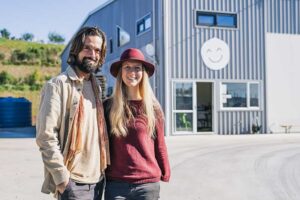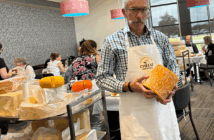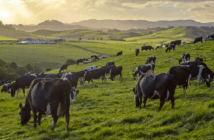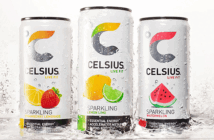
It all started when co-founder Seb Walter began to develop food allergies to dairy. Not wanting to give up their favourite breakfast meal of yoghurt and muesli, his partner Tesh Randall searched for alternatives. After some trial and error, she developed a successful coconut yoghurt recipe and before long it took off in the Raglan community.
Soon they had a real opportunity to turn it into big business. But with big business comes big responsibility – something this environmentally conscious pair took seriously.
For the couple, also known as Mr and Mrs Coconut, sustainability means “the ability to operate in a way that isn’t causing a negative impact on systems” and this is something they have continued to keep in mind as their business expands.
For them running a sustainable business means “not taking more resources than can be replenished naturally or socially. People are paid fairly and able to live sustainable lives themselves. So, [sustainability is]when everything is in balance, and not taking too much from one area,” says Randall.
Right from the beginning, they knew they wanted to create a business that would last and that meant putting in sustainable systems and processes at the very beginning.
“We are setting up a business that we want to continue to operate for a long period of time,” Randall says.
“It’s not a flash in the pan type thing where we take all the profits and keep them for ourselves and run the business into the ground which is, unfortunately, the case for quite a lot of companies.
“You want to find a balance where you are profitable and able to pay for your ingredients and do all the things you need to do but at the same time you’re giving back and balancing all the harm you might be doing in other areas, even if it’s unintended.”
In 2018 Raglan Food Co became the first Carbon Zero Certified yoghurt company in New Zealand. They use glass jars instead of plastic and do work in the community such as sponsoring beach cleanups, partnering with tree planting organisations, ocean cleanups along with many other groups who care as deeply about the environment as they do.
“We know we are creating carbon as a business. We have to ship our yoghurt to stores, we have to get it on shelves and that requires fuel in trucks. We have to get ingredients and jars to us and that’s all freight as well and that’s all carbon. Accounting for that, tracking it and paying to reduce it with native forestry projects and certified audited ways of balancing out that take, is then creating a business that is sustainable so we can continue to operate 10, 20, 50 years from now. We can still be here in the community giving back and making something people like to eat.”
This philosophy goes far beyond just the production of yoghurt for Raglan Food Co and Randall says even small things like the way they have furnished their office is an example of their environmentally-friendly philosophy.
“It impacts on all areas of the business really, from a management perspective and from the types of products we choose to put in our office. I’m looking around at the carpets and tiles in our office. None of them match, they are all offcuts that were going to go to the landfill, and they are all different colours and so on, but we’d prefer to do that rather than buy new stuff. That’s just a small example.
“We also have a partnership with the avocado farm just up the road from us. All the wastewater we have used to wash the tanks after making yoghurt gets pumped up the hill and is used to water the avocados. That’s a sustainable loop. It’s staying within the community; the water is going back into the soil only meters always from where it is used in the factory.”
For Randall and Walter, helping people discover alternatives to dairy is a major reason for their business.
“We are trying to help people transition away from dairy and away from products they might be eating now to something the planet can sustain in the long term rather than relying on cows forever,” Randall says.
“Plant-based is one of the biggest ways that any individual can make an impact on their carbon footprint. Your major contribution of carbon is what you eat more than anything, more than recycling, more than saving water. The only other thing that compares is travel, if you were going to do heaps of long-distance flights all around the world, other than that, it’s your diet. If we can help people change their diet, then we’re going to be making the planet more sustainable.”
And it’s not always easy sticking to these values. It takes away a lot of flexibility Randall says, “but it’s overall far more rewarding”.
“It’s just going to be the way that businesses are expected to run in future. For people starting out, if they can get all these foundational things right from the beginning, working towards B-Corp Certification and thinking about their carbon footprint early, that’s going to save them a lot of administrative work in the future.
“Overall, it is beneficial for everyone because you have increased customer loyalty, and you have a positive brand image. You have people who love to recommend your product for those reasons. So, you will overall be more successful even though the cost of doing so might be quite high initially. Think long term, not short term about what you’re doing.”




























































































